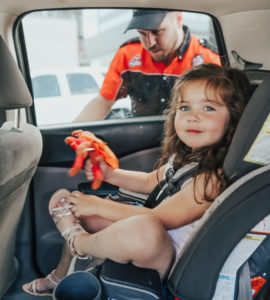Pending Winter Storm Prompts Attention To Free Pop-A-Lock “PALSavesKids” Program
As the Mid-Atlantic and New England regions prepare for what some forecasters are already calling a record snow storm, Pop-A-Lock, the country’s largest security company, reminds parents and emergency organizations about its popular PALSavesKids program that directs regional franchisees and technicians to prioritize calls that involve unattended children in locked cars.
350,000 Children Saved From Locked Vehicles Since Program Inception
The goal of the PALSavesKids program is to prevent vehicular hypothermia and educate caregivers about the program through interaction with customers and the distribution of educational materials to organizations supporting caregivers and children, and through social media.
“We launched this program in 1991 to educate caregivers about the severe dangers of leaving children in unattended vehicles or mistakenly locking a child in an automobile,” said Pop-A-Lock Chief Executive Officer Don Marks. “By using our expertise in the security industry, we are able to quickly and efficiently remove children from harm. This program provides our franchise with the opportunity to thank the communities that have supported our business for so many years.”
Aimed at supporting local police and firefighters, the program instructs parents or other concerned citizens to first call 9-1-1 and then call 1-800-Pop-A-Lock.
The Pop-A-Lock technician nearest to the scene will prioritize the call to arrive as soon as possible to unlock the child from the automobile. This free community service program has saved over 350,000 children since its launch 25 years ago.
Even though children may not be directly exposed to the snow and wind chill, they are still at risk for hypothermia if left in unattended vehicles. The following facts highlight the dangerous severity of leaving children in locked vehicles where they can fall victim to the quick onset of hypothermia:
- Smaller body size and an inability to make enough body heat through shivering puts children at higher risk of hypothermia and frostbite when exposed to cold conditions.
- According to the Drive Steady Advocacy Group, children left in cold cars can suffer frostbit, or hypothermia if their body temperature drops below 95ºF.. Signs of hypothermia include shivering, confusion, memory loss, drowsiness, exhaustion, poor coordination, slurred speech, and numbness. Children may have trouble communicating these symptoms.
- Car seats and wearing restrictive clothing can actually increase the risk and worsen the chances of hypothermia in young children.
- In addition, during winter months snow can block an automobile’s exhaust pipe, which mean parents or caregivers who leave the car on for their children to stay warm are still putting them at risk for carbon monoxide poisoning.
To prevent vehicular hypothermia from occurring, the PALSavesKids program includes a call-to-action: “PALSaves 1-2-3” that reminds caregivers to “look before you lock” by: 1-Stopping; 2-Looking; and then 3-Locking.
PALSavesKids’ mascot, PAL Super Dog, also offers gentle reminders to caregivers to always look in the backseat before leaving the vehicle. Specific recommendations to prevent locking children in automobiles include:
- Keep vehicles locked at all times; even in the garage or driveway and always set your parking brake.
- Put something you’ll need like your cell phone, handbag, employee ID or briefcase, etc., on the floorboard in the back seat.
- Keep a large stuffed animal or favorite toy in the child’s car seat when it’s not occupied. When the child is placed in the seat, put the stuffed animal or toy in the front passenger seat. It’s a visual reminder that anytime the stuffed animal or toy is up front you know the child is in the back seat in a child safety seat.
For more information about Pop-A-Lock Jacksonville or PALSavesKids Emergency Door Unlock Program, visit popalockofjacksonville.com/pal-saves-kids/ and follow us on Facebook (@JacksonvilleLocksmith) and Twitter (@popalockjax).





